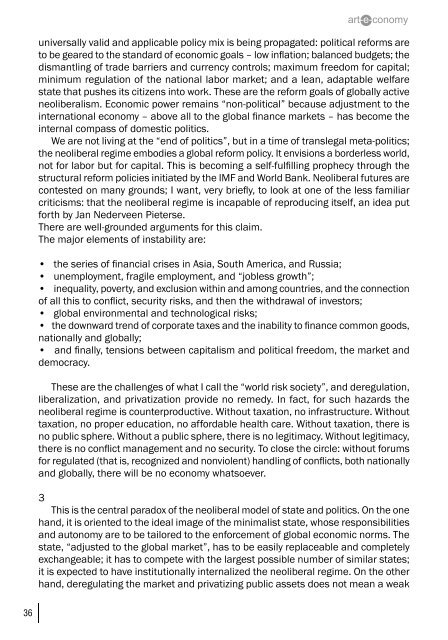art-e-conomy _ reader - marko stamenkovic
art-e-conomy _ reader - marko stamenkovic
art-e-conomy _ reader - marko stamenkovic
Create successful ePaper yourself
Turn your PDF publications into a flip-book with our unique Google optimized e-Paper software.
36<br />
universally valid and applicable policy mix is being propagated: political reforms are<br />
to be geared to the standard of economic goals – low inflation; balanced budgets; the<br />
dismantling of trade barriers and currency controls; maximum freedom for capital;<br />
minimum regulation of the national labor market; and a lean, adaptable welfare<br />
state that pushes its citizens into work. These are the reform goals of globally active<br />
neoliberalism. Economic power remains “non-political” because adjustment to the<br />
international e<strong>conomy</strong> – above all to the global finance markets – has become the<br />
internal compass of domestic politics.<br />
We are not living at the “end of politics”, but in a time of translegal meta-politics;<br />
the neoliberal regime embodies a global reform policy. It envisions a borderless world,<br />
not for labor but for capital. This is becoming a self-fulfilling prophecy through the<br />
structural reform policies initiated by the IMF and World Bank. Neoliberal futures are<br />
contested on many grounds; I want, very briefly, to look at one of the less familiar<br />
criticisms: that the neoliberal regime is incapable of reproducing itself, an idea put<br />
forth by Jan Nederveen Pieterse.<br />
There are well-grounded arguments for this claim.<br />
The major elements of instability are:<br />
• the series of financial crises in Asia, South America, and Russia;<br />
• unemployment, fragile employment, and “jobless growth”;<br />
• inequality, poverty, and exclusion within and among countries, and the connection<br />
of all this to conflict, security risks, and then the withdrawal of investors;<br />
• global environmental and technological risks;<br />
• the downward trend of corporate taxes and the inability to finance common goods,<br />
nationally and globally;<br />
• and finally, tensions between capitalism and political freedom, the market and<br />
democracy.<br />
These are the challenges of what I call the “world risk society”, and deregulation,<br />
liberalization, and privatization provide no remedy. In fact, for such hazards the<br />
neoliberal regime is counterproductive. Without taxation, no infrastructure. Without<br />
taxation, no proper education, no affordable health care. Without taxation, there is<br />
no public sphere. Without a public sphere, there is no legitimacy. Without legitimacy,<br />
there is no conflict management and no security. To close the circle: without forums<br />
for regulated (that is, recognized and nonviolent) handling of conflicts, both nationally<br />
and globally, there will be no e<strong>conomy</strong> whatsoever.<br />
3<br />
This is the central paradox of the neoliberal model of state and politics. On the one<br />
hand, it is oriented to the ideal image of the minimalist state, whose responsibilities<br />
and autonomy are to be tailored to the enforcement of global economic norms. The<br />
state, “adjusted to the global market”, has to be easily replaceable and completely<br />
exchangeable; it has to compete with the largest possible number of similar states;<br />
it is expected to have institutionally internalized the neoliberal regime. On the other<br />
hand, deregulating the market and privatizing public assets does not mean a weak


